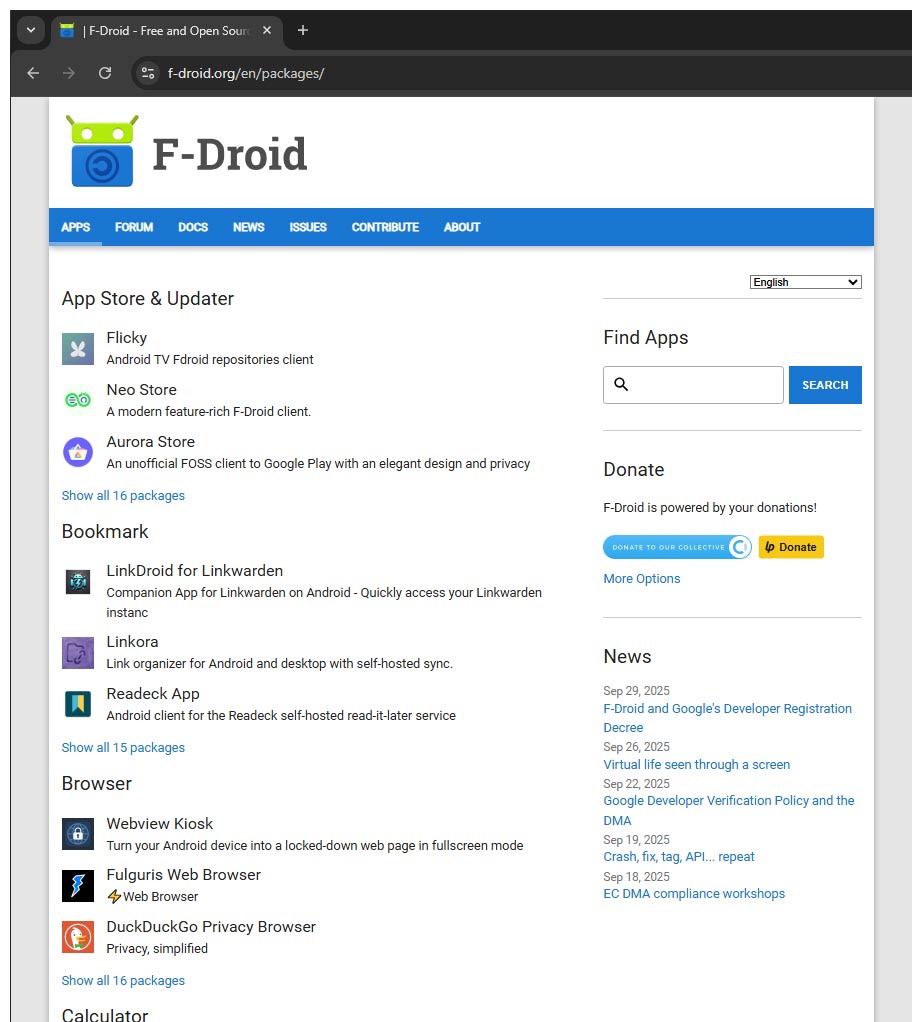
Android’s promise has always been its openness: a platform where users have the freedom to choose, tinker, and distribute without a monolithic gatekeeper.
Unlike locked ecosystems, like Apple's iOS, Android permits side-loading, alternative app stores, custom ROMs and more. With them, a massive community around open source software thrives. Among these alternatives app stores, F-Droid has long stood as the flagship: a repository and app store exclusively for free and open source Android apps, where the source code is visible to all, and where apps with ads, trackers, or closed-source dependencies are flagged or excluded.
F-Droid distinguishes itself by compiling apps from source, verifying builds, and signing them with trusted keys (either F-Droid’s or the original author’s, where reproducible builds permit) so that users can be confident the APK they install matches the published source.
Because of this transparency, many privacy-minded users and developers see F-Droid as safer than “walled-garden” stores, while also upholding digital freedom.
But now, Google’s plan to enforce developer verification threatens to destabilize that very freedom.
And, it can also kill F-Droid, putting it out of operation.
Starting in late 2025 with testing, and more fully in 2026 and beyond, Google intends to require all app developers,whether distributing via the Play Store or via sideloading or alternative stores, to register their identity with Google.
To do this, Google plants to make them present legal documentation, and tie their verified identities to the applications they developed.
In other words, only apps from these "verified developers" will be installable on "certified Android devices."
While the shift may appear to be motivated by security: Google claims that sideloaded apps harbor over 50 times more malware than Play Store apps.
But critics argue that even the Play Store doesn’t fully prevent malicious apps, which means identity verification alone doesn’t eliminate the risk.
However, the deeper concern is that, the move centralizes control of app distribution and erects barriers for independent and open source developers, the very thing third-party app stores like F-Droid are trying to promote.
F-Droid’s leadership is sounding the alarm, because F-Droid itself does not (and cannot) force developers to register with Google, and because F-Droid cannot unilaterally assume app identities or signing keys from independent authors, the new rules clash fundamentally with F-Droid’s model.
The project states that if developers are erased of control or forced into a Google-controlled identity system, F-Droid as the community knows it, cannot survive.
Moreover, Google’s timeline is already putting the death sentence date to these app stores.
According to Google, trials of this identity verification system are expected to begin in places like Brazil, Indonesia, Singapore, and Thailand in September 2026, before expanding globally by 2027.

According to F-Droid in a post on its website:
The ramifications are profound.
For users, it may become impossible to install or update beloved open source apps unless the developer is verified.
For developers who value anonymity, who contribute in spare time without corporate sponsorship, or who lack legal infrastructure, the cost (financial, bureaucratic, or privacy-related) may not be able to ever get their apps installed on Android devices.
F-Droid itself argues this is not merely a technical change but a potential power grab, claiming Google is attempting to consolidate gatekeeping over software distribution.
While F-Droid is just like any other app stores, including Google's Play Store, in terms of vulnerabilities that can still slip up, the change from Google to centralize the decentralized is creating a corporate-based opaqueness to the existing transparency.
In other words, if Google’s plan succeeds, Android risks shifting toward the very model it once competed against.
A lot of smartphones users use Android because they hate the strict ecosystem of iOS.
With the change, Android is literally making itself a shadow of its rival.
